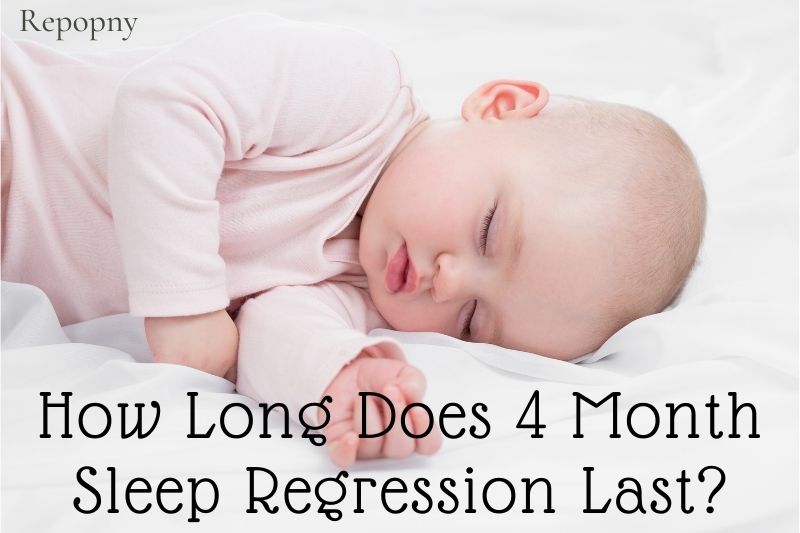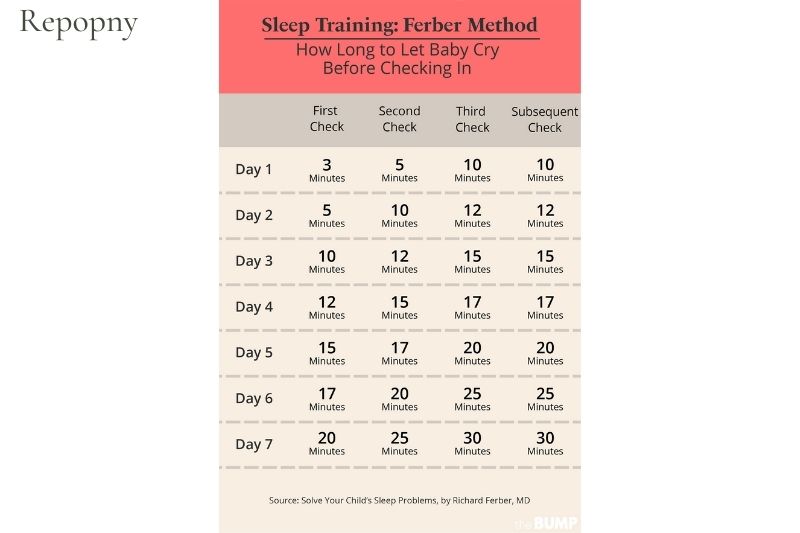It’s hard to answer the question: how long does 4 month sleep regression last. Every baby is different and will respond differently to the regression.
However, most sleep regressions only last a few weeks. So, if your baby is going through a 4-month sleep regression, it shouldn’t last too long.
Contents
- 1 What Is 4-Month Sleep Regression?
- 2 Signs Your Baby Is Going Through The 4-Month-Sleep Regression
- 3 How Long Does 4-Month Sleep Regression Last?
- 4 4-Month Sleep Regression Help
- 5 When Should You Consult A Doctor?
- 6 FAQs
- 6.1 Do babies’ sleep patterns return to regular following a four-month sleep regression?
- 6.2 How can you tell if your four-month sleep regression is over?
- 6.3 Does the four-month sleep regression have an impact on naps?
- 6.4 Is it necessary to feed during sleep regression?
- 6.5 At 4 months, how long does a growth spurt last?
- 7 Conclusion
What Is 4-Month Sleep Regression?
One of the “fine prints” is the four-month sleep regression. You aren’t aware of it until it occurs to you. Around the four-month point, babies’ sleep habits begin to resemble adults, which means they no longer go into a deep slumber. Even yet, many parents are perplexed by their 4-month-sleep old’s regression.
It’s a phase of development. Congratulations if your baby is going through sleep regression! Raise your coffee mug in celebration of your baby’s progress. At four months, a baby’s brain becomes more awake, requiring less “off” time because their brain is “no” more often.
Changes in Sleeping Patterns As a baby’s brain grows more active, it moves from light to deep sleep, similar to an adult’s sleep pattern. This could lead your infant to wake up at 2 a.m., just like you!
Changes in Sleep Requirements To your dismay, it could be your baby’s way of alerting you that they don’t require as much sleep as before. Even that two-hour morning siesta may be cut in half.
Signs Your Baby Is Going Through The 4-Month-Sleep Regression
It’s generally a matter of “you’ll know it when you see it” regarding sleep regressions. Your baby is usually dozing one day. Then, all of a sudden, she’s no longer there.
Most babies can sleep for five hours at a time without waking up by the age of three or four months. Some people may even go for six to eight hours regularly. Your baby has most likely developed a very consistent pattern in terms of when and how often she wakes up during the night.
A night or two of atypical wakings is unlikely to be considered a regression. After all, everyone, including babies, has a stormy night’s sleep now and then.
However, there are several symptoms that you’re coping with during the 4-month regression:
- Your kid is waking up more frequently than usual, especially if there doesn’t appear to be a clear explanation for it, such as travel or illness.
- You notice that your baby is practicing a new skill, such as rolling over, during the day.
- Your baby has grown a lot more interested in her surroundings recently. Perhaps she is more easily distracted when eating or has a more challenging time napping asleep in settings other than her crib.
How Long Does 4-Month Sleep Regression Last?
Once the baby enters this stage, the main concern is when it will finish. While four months may seem like an eternity, it might last two to six weeks. As we all know, every baby is unique.
A baby’s ability to self-soothe and not wake up in the middle of the night is usually learned over two to six weeks. You might find that your kid requires less or perhaps more time to go through this stage. Please cross your fingers that it’s not more, but with babies, everything is possible!
Maybe you are interested: Can A Newborn Sleep With A Pacifier?
4-Month Sleep Regression Help
When you realize your kid is experiencing the dreaded 4-month sleep regressions, your mom bear instincts to fix the situation kick in. Don’t panic; help for asleep regressions is closer than you think! There are things you can do to ease the discomfort for your sanity and your kid’s well-being. Take a look at these strategies:
- Place the baby in their room to sleep. Because waking in the middle of the night is a critical component, a baby needs to learn how to fall asleep independently. This entails putting the child to bed in their room.
- Put the baby to bed when they are sleepy but not completely asleep. If you’re giving your kid a bottle and notice that he’s getting tired, put him to bed rather than waiting until he’s ultimately passed out.
Why? Because your baby will learn to self-soothe and fall asleep without your assistance. This is a huge issue for parents trying to figure out how to deal with 4-month sleep regression.
- Make the dark your ally. Assist your child in learning to associate darkness with sleep. When it’s time to go to bed, make sure the baby’s room is dark. If your baby wakes up in the middle of the night, they will notice that the room is still unclear and that it is still time to asleep.
- Make a sleeping schedule for yourself. There has been some discussion about whether or not establishing a 4-month-old sleep routine is a good idea or if it is too early. No one can deny that a routine benefits a newborn, regardless of whatever side of the fence you sit on this issue. Bath, story, bottle, and asleep routines can help the baby understand what to anticipate and when.
- Increase the amount of time you spend in bed. Those late-afternoon naps might be on their way out. Forcing a baby to take that nap may be disrupting their sleep cycles at night, exacerbating this issue. Putting their baby to bed earlier was a significant benefit, according to parents who have survived sleep regressions.
- Fewer words, fewer actions. It’s all about a little less conversation and slightly less action when the baby wakes up in the middle of the night during this frustrating regression period. Do not pick up the baby.
- Don’t speak to the baby. For the sake of the baby, do not switch on the lights. These activities will communicate that it’s time to get up, which is the exact opposite of what you want to achieve.
The good news is that it does not endure indefinitely; it will ultimately disappear. While there are more developmental milestones on the horizon, try to asleep tight for the time being and avoid being bitten by the virus!
Plus, here’s a chart from The Bump, Feber Sleep Training:
If you worry about when your child cries in sleep, maybe this guide can help: Why Do Babies Cry In Their Sleep?
When Should You Consult A Doctor?
A run of bumpy nights in and of itself isn’t typically the reason for alarm. However, you should consult your pediatrician regarding night wakings if:
- During the day, your infant is eating less than usual.
- Your infant has fewer than four wet diapers and three bowel motions each day.
- Your youngster appears to be gaining no weight.
The regression isn’t enjoyable, but it’s a typical phase of child development. Keep your baby’s sleep patterns as consistent as possible (and maybe sneak in a nap yourself). It would help if you both returned to solid snooze time in a few weeks.
FAQs
Do babies’ sleep patterns return to regular following a four-month sleep regression?
They do, however, come to an end. It should end on its own in two weeks or less if you stick to your baby’s bedtime routine and take care to prevent building any potentially harmful habits (more on that below).
How can you tell if your four-month sleep regression is over?
Because the baby sleeps so little during the day, the caretakers cannot function. In 24 hours, the infant sleeps for less than 10 hours or more than 18 hours. It does not improve after several weeks of attempting several management measures; sleep regression does not improve.
Does the four-month sleep regression have an impact on naps?
Does it have an impact on naps? Your infant may take shorter naps, which is one of the wrong 4-month sleep regression symptoms. After 30 to 45 minutes of asleep, babies frequently wake up and cannot fall back asleep without assistance.
Is it necessary to feed during sleep regression?
During your baby’s sleep regressions, you may find that their appetite has increased substantially. This is typical because your kid is through numerous developmental changes and a significant growth surge.
At 4 months, how long does a growth spurt last?
Growth spurts usually occur in the first few weeks, about 6 weeks, 3 months, 6 months, and 9 months. A growth spurt might happen overnight, and a onesie that fits the day before won’t work anymore. Growth spurts can last anywhere from a few days to a week.
Conclusion
While it isn’t overly uncommon, it’s not something that you should panic about. Most babies regress for about 2-3 weeks and then develop ongoing sleep patterns.
So, if your baby continues the 4-month sleep regression, he is not losing the ability to sleep independently and is likely still developing good sleep habits. Repopny hopes this article helps!







